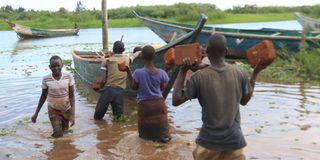BBI overlooks disaster preparedness, response

Budalang’i residents in Busia County use a boat to transport bricks across their flooded village.
What you need to know:
- Proper policy and legislation need to ensure that all health crises continue to receive government attention and response irrespective of incentives and political consideration.
Having read the “Report of the Steering Committee on the Implementation of the Building Bridges to a United Kenya Taskforce”, I am disappointed that disaster response, preparedness and early warning systems seem to have been sidelined.
While mitigating and responding to conflicts as a result of electoral disputes, there is little or no mention of humanitarian assistance to people faced with the effects of drought, floods, locust invasions and other pandemics other than Covid-19.
During the submission of memoranda, communities living on either side of rivers, lakes and other potential risk areas proposed the establishment of a comprehensive policy on mitigating the effects of climate change.
That should take into account specific needs of communities affected by climate phenomena, including those hosting refugee populations.
The general view was that members of the public are grappling with a range of issues, among them natural hazards and disasters, food insecurity and drought, land fraud and forcible dispossession, resource-oriented conflicts occasioned by boundary conflicts and competition for water and pasture.
Out of the 14 articles, none puts an immediate emphasis on emergency response to disasters, risk reduction and early warning to approaching crises.
National emergencies
I was based in Marsabit County last year when drought struck, adversely affecting hundreds of thousands of nomadic people in northern and eastern Kenya. Government officers, including Cabinet secretaries, only traversed the affected counties on popularity trips with no meaningful response plan.
Unlike the National Coalition Government of President Mwai Kibaki and Prime Minister Raila Odinga that established the Office for Special Programmes to respond swiftly to national emergencies, the Jubilee administration appears to relegate disaster response to the second tier.
There is lack of a clear mandate and a vague operating environment during national emergencies amid institutional loopholes that result in bias and financial misappropriation. For example, while Covid-19 is a top global pandemic that requires bold action, other crises, like malaria, tuberculosis and HIV/Aids, still plague poor African countries.
But due to excess funding for Covid-19 coming from the international community, African governments, Kenya included, seem to have ignored other health crises and resigned to singular focus on Covid-19.
Proper policy and legislation need to ensure that all health crises continue to receive government attention and response irrespective of incentives and political consideration.
Nashon Tado, Nairobi




